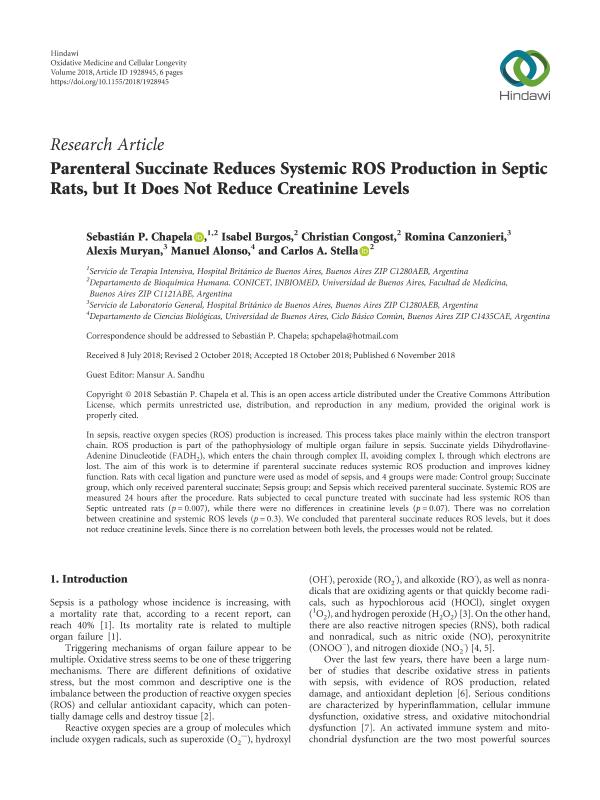Artículo
Parenteral succinate reduces systemic ROS production in septic rats, but it does not reduce creatinine levels
Chapela, Sebastián Pablo; Burgos, Hilda Isabel ; Congost, Christian; Canzonieri, Romina; Muryan, Alexis; Alonso, Manuel; Stella, Carlos Alberto
; Congost, Christian; Canzonieri, Romina; Muryan, Alexis; Alonso, Manuel; Stella, Carlos Alberto
 ; Congost, Christian; Canzonieri, Romina; Muryan, Alexis; Alonso, Manuel; Stella, Carlos Alberto
; Congost, Christian; Canzonieri, Romina; Muryan, Alexis; Alonso, Manuel; Stella, Carlos Alberto
Fecha de publicación:
11/2018
Editorial:
Landes Bioscience
Revista:
Oxidative Medicine and Cellular Longevity
ISSN:
1942-0900
e-ISSN:
1942-0994
Idioma:
Inglés
Tipo de recurso:
Artículo publicado
Clasificación temática:
Resumen
In sepsis, reactive oxygen species (ROS) production is increased. This process takes place mainly within the electron transport chain. ROS production is part of the pathophysiology of multiple organ failure in sepsis. Succinate yields Dihydroflavine-Adenine Dinucleotide (FADH2), which enters the chain through complex II, avoiding complex I, through which electrons are lost. The aim of this work is to determine if parenteral succinate reduces systemic ROS production and improves kidney function. Rats with cecal ligation and puncture were used as model of sepsis, and 4 groups were made: Control group; Succinate group, which only received parenteral succinate; Sepsis group; and Sepsis which received parenteral succinate. Systemic ROS are measured 24 hours after the procedure. Rats subjected to cecal puncture treated with succinate had less systemic ROS than Septic untreated rats (p=0.007), while there were no differences in creatinine levels (p=0.07). There was no correlation between creatinine and systemic ROS levels (p=0.3). We concluded that parenteral succinate reduces ROS levels, but it does not reduce creatinine levels. Since there is no correlation between both levels, the processes would not be related.
Palabras clave:
Sepsis
,
ROS
,
Succinate
,
Intensive Care
Archivos asociados
Licencia
Identificadores
Colecciones
Articulos(BIOMED)
Articulos de INSTITUTO DE INVESTIGACIONES BIOMEDICAS
Articulos de INSTITUTO DE INVESTIGACIONES BIOMEDICAS
Articulos(INBIOMED)
Articulos de INSTITUTO DE INVESTIGACIONES BIOMEDICAS
Articulos de INSTITUTO DE INVESTIGACIONES BIOMEDICAS
Citación
Chapela, Sebastián Pablo; Burgos, Hilda Isabel; Congost, Christian; Canzonieri, Romina; Muryan, Alexis; et al.; Parenteral succinate reduces systemic ROS production in septic rats, but it does not reduce creatinine levels; Landes Bioscience; Oxidative Medicine and Cellular Longevity; 2018; 11-2018; 1-6
Compartir
Altmétricas



